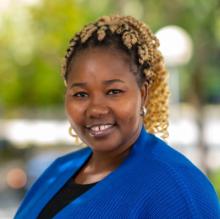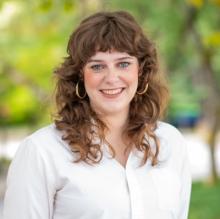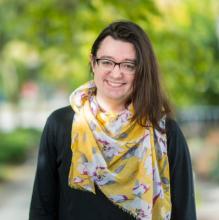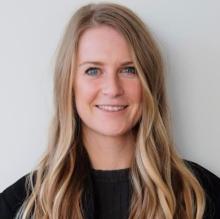Despite how widespread they are and the major impact they have, eating disorders are remarkably undertreated. Alejandra is part of a team that tries to adress this challenge by incorporating patient organizations, and distilling their lessons on peer-support and social connection. Alejandra hopes the results of this collaboration will manifest in new, better solutions to improve patient care, treatment, and recovery.
Research Description
Eating disorders (EDs) are psychiatric illnesses characterized by severe disturbances in eating habits and related behaviours, thoughts, and emotions (APA, 2013). At any given time, approximately one million people in Canada may be diagnosed with an ED (Statistics Canada, 2016). Despite EDs having the second highest mortality rate of any mental illness (see Chesney et al. 2014) and a life expectancy reduction of 20-25 years (Harbottle et al., 2008), only 3-20% of people receive ED treatment (see Pellizzer et al., 2019). Given the gravity of EDs, it is imperative to develop new approaches that expand access to mental health support. Mental health peer support is a promising approach (e.g., Beveridge et al., 2019) that could help reduce the existing treatment gap by providing timely and affordable support, offering hope and connection to clients who feel isolated by the ED, providing psychoeducation about EDs and treatment options, and serving as a stepping stone toward increased treatment-seeking behaviours for clients who feel ambivalent or unmotivated. This research aims to understand the role of peer support in ED recovery by giving voice to the joint experiences of persons with EDs and their peer supporters participating in a peer support intervention. Our research team has developed a collaboration with a local non-profit eating disorders organization that has developed a mental health peer support program to engender feelings of connection and hope. Given that EDs thrive in isolation, social connection and hope are vital mechanisms that promote ED recovery (Ramjan et al., 2017). This research will produce knowledge that will contribute to the public good by creating innovative and affordable initiatives to overcome common barriers to accessing ED mental health support.
What does being a Public Scholar mean to you?
Being a Public Scholar means having the opportunity to join a community of like-minded graduate students and scholars who are passionate about directly impacting members of the public through their community-engaged research. It also means practicing social responsiveness in my field and being accountable to the larger society beyond academia. Finally, it is important to me to grow as a future psychologist who can influence change at a societal level through my research and advocacy efforts.
In what ways do you think the PhD experience can be re-imagined with the Public Scholars Initiative?
The Public Scholars Initiative provides a source of support and encouragement for students to pursue research projects that do not fit into the traditional academic framework. As such, students can find a sense of community as they are supported in reimagining their PhD degrees and developing research that can meaningfully engage community members. This community focus and creativity in designing rigorous research is a vital part of reimagining the PhD experience.
How do you envision connecting your PhD work with broader career possibilities?
I envision connecting my PhD work to broader career possibilities by applying the knowledge and skills I develop through the Public Scholar Initiative. A goal of mine is to continue growing as a scientist-practitioner with a strong focus on social justice and advocacy initiatives. The knowledge that I will gain through the PSI will significantly support this goal as I will be able to gain new skills and strengthen the competencies that I have been developing. I am particularly excited to learn more about knowledge translation, community outreach methods, and the bridge between research and advocacy.
How does your research engage with the larger community and social partners?
Our research focuses on understanding the role of peer support in eating disorders recovery. The larger context surrounding this research focus involves examining how societal structures can increase access to mental health support for people experiencing an eating disorder. Eating disorders tend to isolate people. As such, an essential factor in recovery is social connection and a sense of community. Given the research focus and context, it is imperative to create community-based research initiatives and include social partners. For our research, we are collaborating with a local non-profit organization that focuses on helping people with eating disorders through social support.
Why did you decide to pursue a graduate degree?
When I first came to UBC during my undergraduate degree, and I started to take psychology courses and became involved in research and relevant leadership opportunities, I confirmed my goal to pursue a PhD. My undergraduate experience was so positive in terms of my professional development and the friendships that I built through these experiences. I loved psychology, and I wanted to continue learning as much as possible, surrounded by like-minded students. My core motivation to pursue a graduate degree is the desire that I have always had to help others through research and practice. I started to reflect early on throughout my high school experience on how many people struggled with their body image or an eating disorder and how difficult it was to access support. Although there are many factors contributing to the aetiology of eating disorders, I also believe that it is largely a social justice issue that demands attention and resources to alleviate people's suffering and contribute toward their holistic well-being.
Why did you choose to come to British Columbia and study at UBC?
Throughout my undergraduate, master’s, and PhD programs, I have felt grateful to access a globally recognized university. Beyond being a stunning place, I chose to continue my graduate degree at UBC because of the invaluable friendships and professional relationships that I have built over the years. Working with my supervisor, Dr. Richard Young, has enabled me to work with an expert in counselling psychology and pursue opportunities in an additional area of research (i.e., understanding the experiences of newcomers to Canada) that I feel strongly about. Having lived in Vancouver since the age of 12, it was also important to me to pursue graduate school while being surrounded by family and friends.




